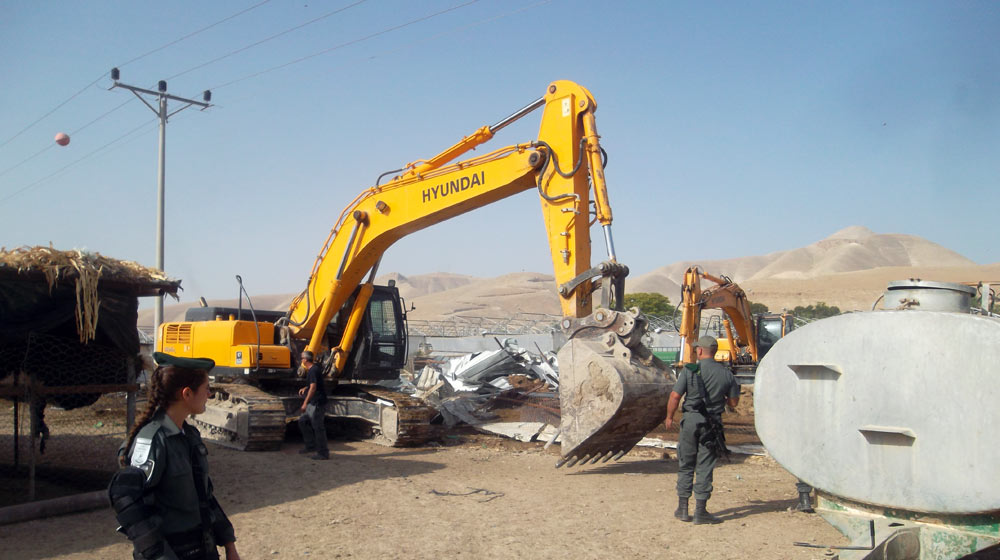Refusal to be crushed in the Jordan Valley

The Ibrahims’ wrecked home. All Palestinian homes in the Jordan Valley are makeshift because they cannot get planning permission for building better houses nor get connected to mains electricity and water supplies.
Israel‘s civil administration set to demolish Palestinian homes in the Jordan Valley
By Amy Mac, Palestine Monitor
November 25, 2015
In the early hours of the morning, Aug. 18., Mohammed Ibrahim was woken by the sounds of bulldozers and Israeli army jeeps outside his family home, located in the Fasayil village in the northern Jordan Valley.
“Our children were still sleeping when the army arrived. They woke up the children and told us to leave. They had come to destroy our home,” Ibrahim said, sipping sweet tea and watching the sun sink behind the hills of Jordan.
Along with his wife, children and one grandchild, the family of eight quickly gathered whatever possessions they could before the makeshift structure in which they lived was demolished.
“We took out as much as we could, but there were still items in the house when they destroyed it, they destroyed the TV, the fridge. They did not give us much time,” Ibrahim said.
Ibrahim’s home, his son’s home and the enclosure for his sheep were razed. In total, Israeli forces demolished 17 structures: 10 residential tents and shacks, and the remainder for livestock rearing. Forty-eight people were left homeless.
“They made sure to completely destroy everything, so we couldn’t use the materials to rebuild another structure,” said Ibrahim.

Civil Administration bulldozers demolishing structures, Id’eis. Photo: Yusef Bani ‘Odeah, 21 May 2014. From B’Tselem report Civil Administration demolishes nearly half the homes in community of Id’eis, the Jordan Valley
The family was forced to live outside for twenty days, seeking shelter under the trees in the 40-degree heat.
Ibrahim managed to build a new structure to live in and has started to settle back into the normal routine of life, tending to his sheep and selling the cheese and milk as a means of subsistence.
On Tuesday, November 17, civil administration representatives again visited Fasayil and informed Ibrahim that if the community residing in that area did not vacate their homes within a week, all structures built since August’s demolition would again be destroyed.
This will be the fourth time Ibrahim’s home has been demolished in the twenty years he has lived in Fasayil.
Mohammed Ibrahim on his land. Photo by Amy Mac
In many communities in the Jordan Valley, as in other parts of the West Bank, Israel prevents Palestinians from establishing permanent homes and connecting them to water and electricity.
The land on which Ibrahim lives in Fasayil village, like 88 percent of the Jordan Valley, is designated as Area C, meaning it is under full Israeli civil and security control.
According to Israeli human rights group B’Tselem, “these demolitions take part in the context of efforts by the military and the Civil Administration to push Palestinian communities out of Area C.”
The Jordan Valley is a vast and sparsely populated region, rich in land and water resources and with expansive opportunity for agricultural development.
“Just in the Jordan Valley, there is enough space and resources for all Israeli and Palestinian people,” said Rasheed Khderat, coordinator of the Jordan Valley Solidarity Campaign.
However, Israel’s policy on the Jordan Valley aims at stifling the growth of the Palestinian population, reducing Palestinian presence in the region through frequent housing demolitions and land confiscations.
According to B’Tselem, from January 2006 through the end of April 2013, the Civil Administration demolished at least 315 residential units in Palestinian communities in the Jordan Valley, home to at least 1,577 Palestinians.
Under various pretexts, Israel has also severely restricted Palestinian access to most of the region’s abundant resources.
While Israel controls the water and provides it to settlers freely, Palestinians are prevented from collecting rainwater and digging wells deeper than 150 metres.
The residents of these communities rely on scant rainfall, which they collect in cisterns and on water trucks brought in by private contractors.
The average water consumption in these communities is only twenty litres per person per day, according to B’Tselem. The World Health Organization recommends a daily water consumption of 100 litres per person.
“The Israelis have the rights to use the land’s resources and water, to have Israeli farms and make businesses and build houses and we are not allowed to have this right,” said Ibrahim.
However, the Palestinian community of the Jordan Valley remains steadfast in its determination to stay on their land.
“We exist to resist,” explained Khderat. “The Israelis can take our water supply, demolish our homes, our schools, but we will not leave. We will stay here, we say no, we resist without violence.”
Ibrahim echoes a similar sentiment. Following the demolition order, there is nothing more he can do but wait for his house to be destroyed. Yet he refuses to leave, fierce in his conviction that it is his human right to remain with his family in the Jordan Valley.
“I will resist. This land is like my life. They have destroyed my house three times, this will be the fourth. Four, five, it’s no problem. We will rebuild it. What more can we do? This is the only way.”
Link
Most Palestinians in the Jordan Valley are Bedouin. They live in makeshift structures in part because they have no alternative but in part because the herders move their animals to where there is good grazing. They pride themselves on having minimal environmental impact. Read more at Jordan Valley Solidarity.

